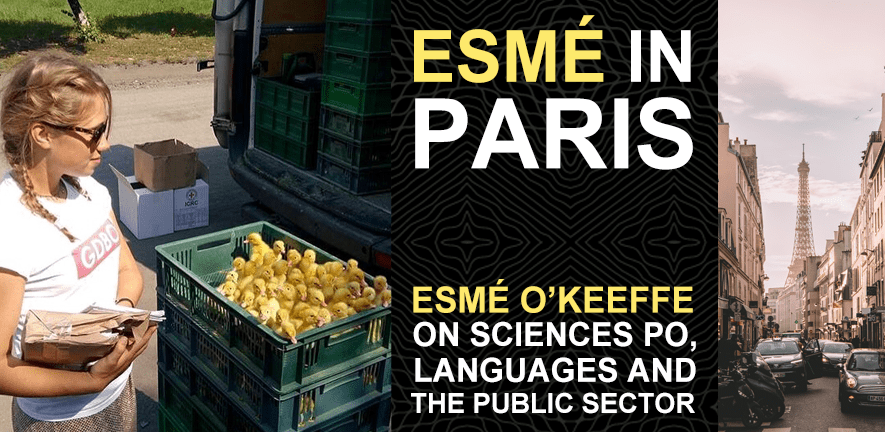Esmé O’Keeffe, Master’s student at Sciences Po, Paris, shares why a Master’s was the next step from Languages and Politics at Cambridge to her goal of working in the Public Sector, and the experiences that helped her journey
I studied Part I MML (French, Italian and Ukrainian) and then, on returning from my year abroad, a 1-year Part II Politics at Corpus Christi (2015-2019). I am now a second year Master’s student on the International Security Programme at Sciences Po Paris.
Why choose a Master’s at Sciences Po?
Sciences Po ranks second in the world for Politics and International Studies,[1] but it couldn’t be more different from Cambridge. The approach is didactic, ‘Napoleonic’, and similar to a French lycée experience: the course is two years, heavily taught with a huge face-time culture, with little time to investigate any topic in depth, and teachers are referred to as Monsieur or Professeur. Sometimes, it feels like being 15 again. Where an arts degree at Cambridge encourages analysis and critical thinking, the ‘academic’ approach at Sciences Po is more interested in the answers than the questions, and in empirical cases rather than ideas (many courses are taught by professionals rather academics, such as retired army generals and consultants). This approach can have its advantages, but after the independence of thought and character that Cambridge fosters, it feels like a bit of a step back.
while Sciences Po is not designed to offer the intellectual, research-based experience that characterises British universities, its unique selling point is employability.
For linguists, one of the attractions of Sciences Po is the high value placed on language-learning: students are encouraged to take courses from the Language Centre (the credits all count towards the degree) and about half of courses on offer are taught in French (with the other half in English). And while Sciences Po is not designed to offer the intellectual, research-based experience that characterises British universities, its unique selling point is employability. Students are encouraged to undertake an internship in their third semester (beginning of second year): a Master’s degree from Sciences Po is supposed to be an important stepping stone in your career. And this was precisely why I enrolled. During my undergrad, I realised that I wanted to work in humanitarian emergencies or international development – for a UN agency, for example – but the vast majority of roles available require a Master’s degree.
Gaining experience and using languages.
Before enrolling in my Master’s Programme, I had several experiences (both internships and volunteering) which developed my interest in humanitarian and development work – all of which were also an opportunity to use my languages!
In the summer of my first and second year I worked with a grassroots charity in the conflict zone in Ukraine. This put my pidgin Russian to the test, and persuaded me to take SL9, an Introduction to Ukrainian (which, incidentally, was my favourite MML course). I also relied on my French while volunteering in the refugee camps in Calais with the Cambridge University Calais Refugee Action Group (CUCRAG). On my year abroad, I did a summer internship at the World Food Programme Headquarters in Rome, where needless to say I used my languages a lot! English and French are official languages of the UN, so I was writing, handling and translating resources in both languages (the countries in West Africa, for example, use French) and in the office we spoke a mixture of English, French and Italian slang. I had a baptism of fire at the Executive Board, when I was sent to take notes at a meeting of East African ambassadors. At the last minute, one of the ambassadors – who only spoke French – realised that the meeting would be conducted in English, so I stepped up to the mark and acted as her personal simultaneous interpreter for the duration!

I realised that at undergrad level almost any work experience is good experience.
I also spent 5 months working for Deloitte in Paris on my year abroad. Although I knew that, ultimately, I wanted to end up working in the public sector, I realised that at undergrad level almost any work experience is good experience. My internship at Deloitte allowed me acquire basic professional skills that were transferable to the other work I have done since – whether at the World Food Programme, at a commercial law firm in Rome, or even in obtaining job offers from the Civil Service Fast Stream and Slaughter & May.
I have come to realise that there is no rush.
My European contemporaries struggle to believe that in the UK we are spat out after a 3-year undergrad into the world of work; at WFP and Sciences Po, many of my peers were much older and had studied for longer or taken more circuitous routes. There are hundreds of opportunities for MML grads to flex their language skills. But if you want a career in development, you will need a Master’s, and Sciences Po is a good bet. It is very different to the British system, so be forewarned, but if you go with a clear idea of what to expect it can be a great experience.
[1] 2020 QS World University Rankings.

